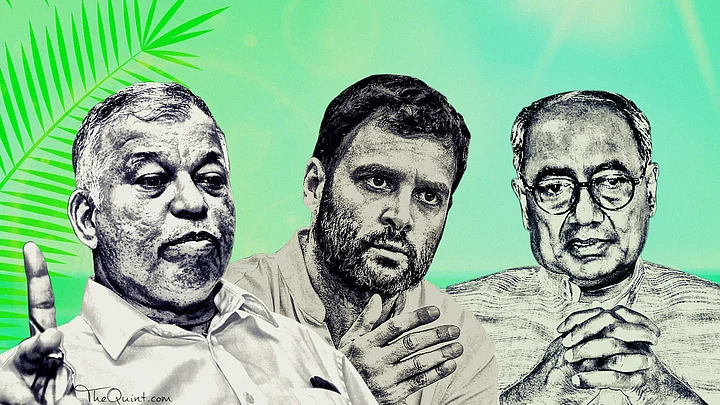On the fourth day after announcement of election results in Goa, Congress leaders have finally made up their mind to meet the governor. This development comes after the Supreme Court refused to give it a relief.
Having lost the plot in Goa, despite emerging as the single largest party, the blame game has begun at the local as well as national level within Congress. While the party leaders are busy shifting the blame, here are the 7 mistakes the party needs to learn from and not repeat in the future.
1. Right Alliances:
Congress tactically allied with the Samajwadi Party in Uttar Pradesh, but decided to ignore potential allies in Goa, despite the challenge posed by AAP. Vijay Sardesai of Goa Forward Party (GFP) is a former Congressman and was interested in a pre-poll tie-up with the Congress.
While Sardesai was in talks with Digvijaya Singh, who is incharge of Goa, Congress candidates filed nominations from the seats demanded by GFP. Sardesai felt cheated and held a grudge against the party that he’s ideologically closer to.
Lessons: Need to make right alliances and need better coordination between national and local leaders.
2. Bridge gaps in local factions:
Congress in Goa is divided into various camps of Digambar Kamat, Pratapsingh Rane and Luizinho Faleiro, etc. The story is similar in many other states. In the recently held Mumbai elections too, the factional war in the party had broken out in public.
Top leaders of the Congress seem to be either disinterested or unable to douse the fire. Many Congress leaders have accepted factional split-up as ‘normal’, with little being done to change the status quo. The infighting not only affects the party’s functioning, but also slows down decision-making processes.
Lesson: The top leadership should make serious efforts to bring warring groups together.
3. Planning After Voting
After voting gets over, all parties get their feedback through internal machinery. Generally, the feedback helps little as results are to be announced in a few days.
But in case of Goa, there was a gap of over a month between voting and counting. If the Congress knew that it was doing well and that the AAP was down, it should have made contingency plans. As the campaign dust had settled down, BJP leaders used this time to reach out to leaders of various parties.
This preparation helped the BJP move swiftly after the results were announced.
Lesson: Never relax. In politics, there is no time to cool your heels.
4. Move Swiftly After Results
After the results were out, BJP caught relaxing Congress leaders unaware. Parrikar and BJP’s state incharge Nitin Gadkari, moved swiftly and won over smaller parties including Maharashtrawadi Gomantak Party (MGP) and even GFP, which is a splinter of Congress.
Vijay Sardesai of GFP reportedly told media persons that he was waiting for a call from Congress, but no one called on the day of counting. Top BJP leaders got in touch with him, promised him posts in the government and received his support.
Lesson: Empower state leadership and move fast.
5. Leader Should Be Fixed
The BJP shows that the Chief Ministers of Maharashtra or Haryana or Jharkhand were selected by the MLAs, but it’s an open secret that they were handpicked by Modi-Shah. The same is said about UP. Till the process is on, Amit Shah stations himself in the state capital, or closely and personally observes every development.
Congress needs to rid itself of the old, slow processes, where various pressure groups visit the High Command, then late night meetings are held in the Capital, then observers are sent to the state capital, then the observers listen to MLAs one-by-one, then observers go back to Delhi, and then more meetings happen in Delhi, and then, finally, the CM’s name is announced.
Sources have told The Quint that Faleiro was adamant to be the CM and had the support of majority of MLAs. However, GFP’s Sardesai wasn’t ready to work under Faleiro. The tussle between Falerio and other factions took a lot of time, and BJP took advantage of the delay.
Lesson: Fasten seat belts and choose your leader even faster. No one is going to wait for your decision.
6. Stake Claim Immediately
Rahul Gandhi had famously said in 2013 that “power is poison”. However, the reality of competitive politics is that power is the ultimate elixir for people involved in it.
Congress seems to have lost the urge to be in power. Getting support of smaller parties does not always mean horse-trading. It needs the urge, communication skills and decisiveness.
Lesson: After the Goa and Manipur episodes, every single largest party should first stake the claim and do the arithmetic later.
7. Be In Touch With Your Own MLAs
It seems that Congress leadership is not even in touch with its own MLAs. Newly elected MLAs of the party in Goa are so disillusioned with party’s handling of the situation that they’ve gone public and expressed their anger on TV channels.
As the party is divided into various camps, Digvijaya Singh had a larger role to play, but now he’s been accused by his own men.
I am very disillusioned with the way the Goa scenario was handled, and it is very shameful.Vishwajit Rane, Congress MLA
Some Congress MLAs reportedly met Parrikar. If these reports in local media are true, Congress has one more reason to worry.
Lesson: Keep your flock together; never take your people for granted. Communication is the key.
(At The Quint, we question everything. Play an active role in shaping our journalism by becoming a member today.)
